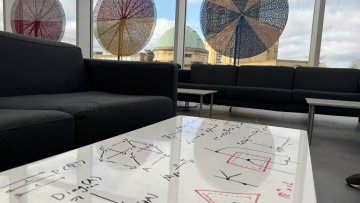The two Graduate Scholarships, generously funded by G-Research, will focus on advancing research in machine learning. They form part of a package of nine scholarships distributed between the Departments of Statistics, Computer Science and Engineering Science as well as Mathematics.
The funding aims to support students with proven and potential academic excellence, enabling departments to offer these prestigious scholarships to their very top candidates.
13:00
A Primer on Carroll Geometry
Abstract
This brief pedagogical talk introduces key concepts of Carroll geometries, which arise as the limit of relativistic spacetimes in the vanishing speed of light regime. In this limit, light cones collapse along a timelike direction, resulting in a manifold equipped with a degenerate metric. Consequently, physics in such spacetimes exhibits peculiar properties. Despite this, the Carroll contraction is relevant to a wide range of applications, from flat-space holography to condensed matter physics. To complement this introduction, and depending on the audience’s interests, I can discuss Carroll affine connections, symmetry groups, conservation laws, and Carroll-invariant field theories.




 Kamoa, a fast-growing fintech startup operating in Kenya and Nigeria, is looking for a Data Scientist Intern to join their team.
Kamoa, a fast-growing fintech startup operating in Kenya and Nigeria, is looking for a Data Scientist Intern to join their team. 
 We are now on Bluesky (oxfordmathematics) to add to our other social media: TikTok, Instagram, YouTube, Facebook, X and LinkedIn.
We are now on Bluesky (oxfordmathematics) to add to our other social media: TikTok, Instagram, YouTube, Facebook, X and LinkedIn.